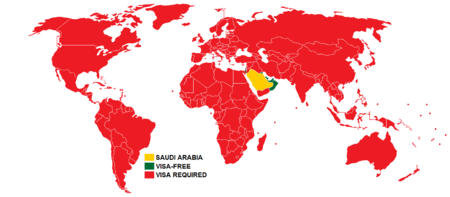Visa policy of Saudi Arabia

Citizens of all countries require a visa to visit Saudi Arabia except the citizens of the Gulf Cooperation Council members, Bahrain, Kuwait, Oman, Qatar, and United Arab Emirates.[1] All visitors must hold a passport valid for 6 months.[2] Visitors holding passports containing any Israeli visa or stamp may be refused entry; Israeli passport holders are refused admission and transit.[3][4]
Visa exemption also applies to holders of diplomatic and official passports of France.
Muslim female passengers arriving to perform Umrah or Hajj must either be accompanied by an immediate male family member such as a father, brother, husband, or son, who must be aged 18 years or older; or be over 45 years of age and travelling within a group of female passengers of the same age, who are accompanied by a group leader until their departure.
In December 2013 Saudi Arabia announced its intention to begin issuing tourist visas for the first time in its history. Council of Ministers entrusted the Supreme Commission for Tourism and Antiquities with visa issuing on the basis of certain regulations approved by the Ministries of Interior and Foreign Affairs.[5] A limited tourist visa programme was cancelled in March 2014.[6] In December 2014 the Saudi Arabian authorities reiterated that tourist visas will not be reintroduced. However, in April 2016, Crown Prince Muhammad bin Nayef announced that plans to start issuing tourist visas as part of Vision 2030, which aims to diversify Saudi economy and leading it away from an oil dependent economy. Saudi Arabia has welcomed Uber and Six Flags parks in its initial steps towards amplifying the tourism sector.[7]